Single mothers vulnerability to homelessness and impact on children
04.03.20
UN New York - Report on the side-event that MMM organized on the margins of the 58th session of the Commission on Social Development on 18 February 2020 at the UN headquarters in New York.
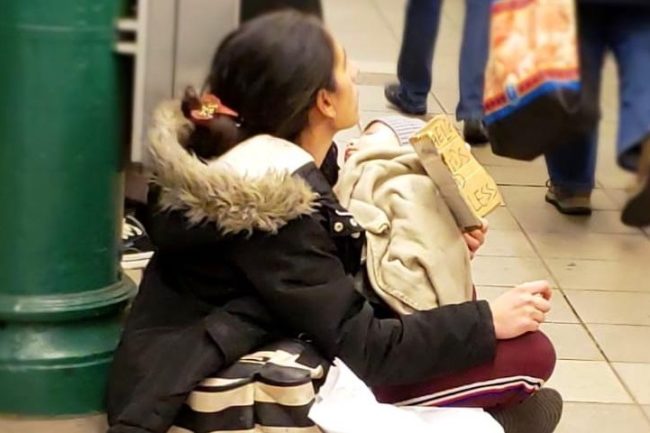
The objectives of our side-event were 3 fold:
- To raise awareness of single mothers’ vulnerability to homelessness, through a portrayal of the current situation in select countries (statistics and testimonials)
- To highlight the impact of homelessness on mothers and children, particularly the very young, and the long-term costs to society
- To showcase examples of good practices that address and prevent homelessness in single-parent families
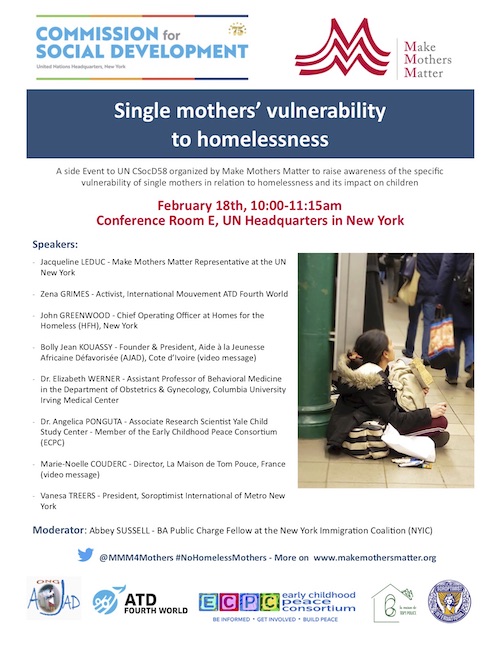 The event was co-sponsored by our partner, the Early Childhood Peace Consortium (ECPC), as well as the International Movement ATD Fourth World and Soroptimist International. Organized as a panel, it was moderated by Abbey SUSSELL MPH, BJ, BA – Public Charge Fellow at the New York Immigration Coalition (NYIC).
The event was co-sponsored by our partner, the Early Childhood Peace Consortium (ECPC), as well as the International Movement ATD Fourth World and Soroptimist International. Organized as a panel, it was moderated by Abbey SUSSELL MPH, BJ, BA – Public Charge Fellow at the New York Immigration Coalition (NYIC).
It was broadcast Live on Facebook (watch the recording) – #NoHomelessMothers
See also speakers’ bios and conceptual information with our invitation
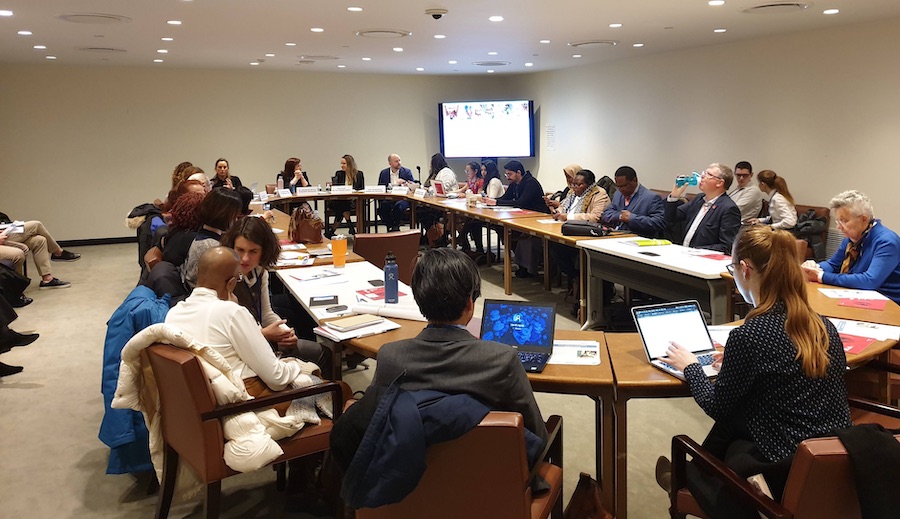
Highlights from each speaker’s presentations
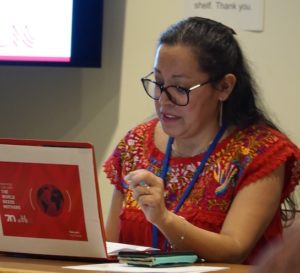
Jacqueline Leduc, MMM Representative to the UN in New York
Jacqueline LEDUC, Representative at the UN in New York for Make Mothers Matter, outlined the various possible causes of single motherhood, highlighting that in the vast majority of cases, it was not a choice. She presented statistics on the interconnectedness of single motherhood and homelessness and introduced the socio-economic consequences for mothers and children – See also her PowerPoint presentation
- Zena GRIMES, Activist at International Movement ATD Fourth World described her experience living in shelters in three of New York’s boroughs. She highlighted the social stigma and the stress of having to move from one shelter to another, constantly readapting, especially for the children who had to change schools. She noted the difference between raising children in a shelter situation and not. Her determination to never give up came through. Her children gave her the strength to source a home and support them – See also her full-text testimonial
- John GREENWOOD, Chief Operating Officer at Homes for the Homeless (HFH), an affiliate of the Institute for Children, Poverty, and Homelessness, highlighted two policy issues: the lack of affordable housing, which leads to clients staying in the shelter system for long periods of time, and the need for a coordinated effort between all agencies. If clients are with them for a while, it provides an opportunity to meet them where they are and to propose confidence-boosting programs and activities (like learning to tie a tie, cooking healthy meals, talent shows, family workshops, summer camps for children, makeover workshops, artistic outlets, etc.).
- Jean Bolly KOUASSY, Founder and President of Aide à la Jeunesse Africaine Défavorisée (AJAD), an MMM associate member in Côte d’Ivoire via Video Message. Following a testimonial from a homeless mother of two boys, Mr. Kouassy explained that the situation she described was increasingly common in Côte d’Ivoire: too many pregnant women are abandoned by run-away men and left alone with children, who are often not registered and cannot go to school. He called for action at both the local and national level, to find these men and to establish care structures for single mothers and their children – See video message below
- Dr. Elizabeth WERNER, Associate Professor of Behavioral Medicine at Columbia University and Member of the Perinatal Pathways Lab, addressed the interrelationship between single motherhood, homelessness and postpartum depression (PPD). In stressful situations such as those experienced by homeless mothers and mothers with PPD, the bi-directional, mother-child capacity to bond is affected, thus threatening the harmonious development of the child, negatively impacting his or her future – See also her PowerPoint presentation
- Dr. Angelica PONGUTA, Associate Research Scientist at Yale Child Study Center and Member of the Early Childhood Peace Consortium (ECPC), detailed the multi-dimensional nature of the problem: poverty, toxic stress, homelessness have life-long implications – for children especially. She also stressed the importance of the “community of care” for child development: mothers, fathers, but also the neighborhood, the religious community, the village or city… what happens around the mother can help restore her self-confidence. By changing context and helping the mother, the bonding with the child, which is so important during the early years, can be restored. Parents and children need social protection and access to health care. Recognizing and solving this inequity is a responsibility and a challenge we all need to address – See also her PowerPoint presentation
- Marie-Noelle COUDERC, Director of La Maison de Tom Pouce, an MMM associate member in France, explained in her video message that the association operates shelters that unconditionally welcome pregnant women and new mothers with their babies, for up to 6 months. Many of them have had a violent migratory journey. While in the shelter, mothers receive special care and friendly accompaniment, learn to take care of themselves and their babies, and receive guidance as to how to find their place in society. Ms. Couderc stressed the magnitude of the problem and the urgent need to act: too many single mothers in France have nowhere to go when they leave the maternity ward – See video message below
- Vanesa TREERS, President of Soroptimist International of Metro New York, presented “Live Your Dream”, an educational project that aims to empower women and girls, thus contributing to the prevention of poverty and homelessness – See also her PowerPoint presentation
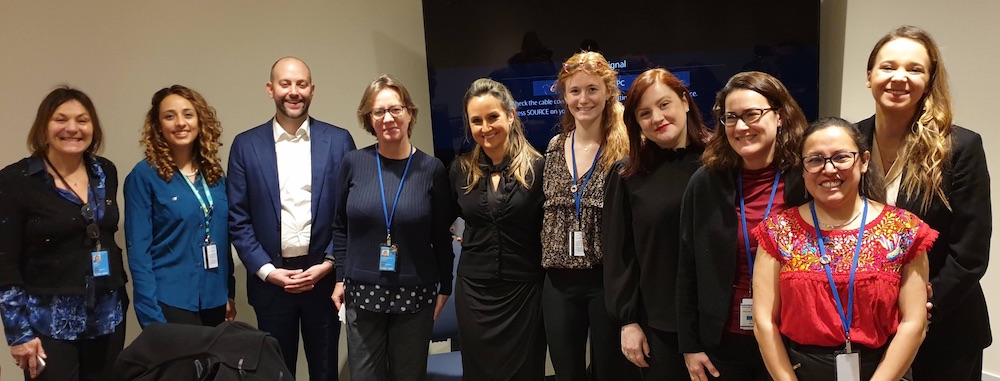
MMM Team and Speakers – From left to right: Laurence Stip (MMM), Vanesa Treers (Soroptimist Intl.), John Greenwood (Homes for the Homeless) Inès Rosell (MMM), Dr. Angelika Ponguta (Yale Child Study Center/ECPC), Inès de Vulpian (MMM), Dr. Elizabeth Werner (Columbia University), Lise Baulne Nasim (MMM), Jacqueline Leduc (MMM), Abbey Sussel (NYIC)
Post-presentation discussion and recommendations
MMM recommendations relate to prevention, specifically addressing the economic and social root causes of single mothers’ vulnerability to poverty. No single mother should be left behind.
- As per SDG 1 – No Poverty (Target 1.3) – Provide adequate social protection, beginning with a social protection floor that guarantees a minimum of income (through child and/or housing allowances), as well as maternity protection and access to essential health care;
- As per SDG 5 – Gender Equality (Target 5.4) – Develop public infrastructure and services that aim to reduce unpaid care work and include quality and accessible childcare services;
- As per SDG 3 – Good Health and Well-Being (Target 3.4) – Provide social and psychological support services to prevent burnout and mental illnesses linked to being a single mother;
- As per SDG 8 – Decent Work and Economic Growth – Implement family-life reconciliation policies, including the right to request flexible working arrangements, and policies to address the “motherhood penalty” at work.
Zena Grimes stressed the importance of education. She also suggests promoting activities that boost self-confidence.
John Greenwood recommends increasing support to homeless children in the scholar system, including early education programs, which would also be helpful to their mothers. He also took a question from International Movement ATD Fourth World about the possibility of integrating maternal and perinatal services in the shelter system (not currently available).
Dr. Elizabeth Werner recommends making mental health care more accessible, especially during pregnancy and the postpartum period. Mental health care can break the cycle of intergenerational transmission of poverty, stress, depression, and homelessness.
Dr. Angelica Ponguta recommends the empowerment of local government, as the most important factor in recognizing, preventing and solving family- and child-centered challenges, including single mother homelessness.
Vanesa Treers underlined the need to forward recommendations from the CSocD58 to states and stakeholders.
In conclusion, unpaid family care work should be at the core of policies addressing women’s poverty, with the explicit objective of recognizing, supporting and redistributing the essential work of caring for others. Parents, especially single mothers, must be supported in their work and their responsibility of raising and educating the next generation of citizens and workers. Social protection must be extended to include housing, which is an essential building block for education, health, and access to the labour market. Supporting families must be seen as an investment.
Participation of MMM associate members
Thanks to video messages, this event brought the voices of 2 of our grassroots members to the United Nations in New York: Aide à la Jeunesse Africaine Défavorisé (AJAD) from Côte d’Ivoire and La Maison de Tom Pouce from France.
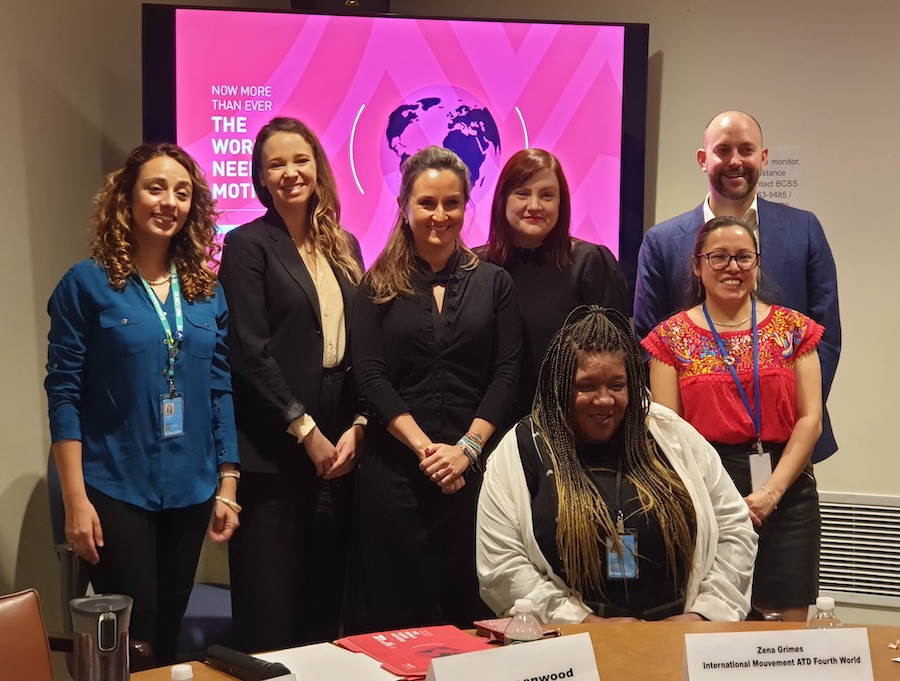
Speakers with moderator – From left to right: Vanesa Treers (Soroptimist Intl.), Abbey Sussel (NYIC), Dr. Angelika Ponguta (Yale Child Study Center/ECPC), Dr. Elizabeth Werner (Columbia University), Zena Grimes (International Movement ATD 4rth World), Jacqueline Leduc (MMM), John Greenwood (Homes for the Homeless)
We would like to warmly thank all our speakers and participating organisations, including
- The co-sponsors of this event: International Movement ATD Fourth World, the Early Childhood Peace Consortium and Soroptimist International
- Our associate members AJAD and La Maison de Tom Pouce.

See also the exhaustive event report on the ECPC website,
and other related articles on our website:
- Invitation – CSocD58 Side-event on single mothers and homelessness – with background information
- Single mothers need support, not stigmatization – our written Statement to the UN Commission on Social Development on the issue of homeless mothers
- Single mothers disproportionately affected by lack of adequate housing – our oral statement to the 43rd Session of the Human Rights Council
The New EU Gender Equality Roadmap : A Call for Inclusion of Mothers
04.03.25
The European Commission’s initiative on a new Gender Equality Roadmap post-2025, marks a significant step forward in addressing gender disparities across the European Union. Make Mothers Matter (MMM
Breaking the Cycle: Gender Equality as a Path to Better Mental Health
18.03.25
The Council of the European Union has taken a decisive step in recognising the vital connection between gender equality and mental health.
Europe Must Listen to Mothers: Our landmark report heads to the European Parliament
28.08.25
On 22 September 2025, the voices of mothers will take centre stage in Brussels. For the first time, Make Mothers Matter (MMM) will present its State of Motherhood in Europe








